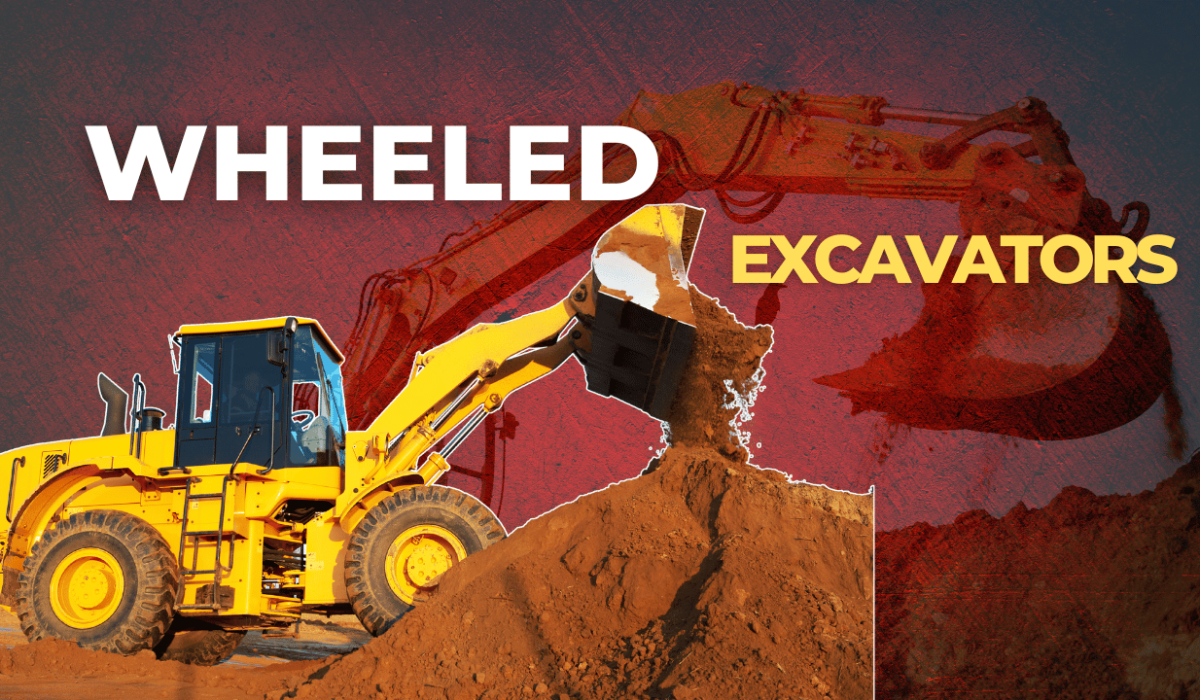Preserving competitiveness in the busy construction industry asks for adaptability and effectiveness. New wheeled excavators now mix power and maneuverability. From home building to infrastructure upgrades, their metro performance qualifies them for many applications.
A wheeled excavator might make all the difference between expensive delays and reaching targets as projects grow more complicated.
Wheeled excavators shine in their economy. Purchasing this equipment provides your fleet with tools and creates fresh production and cost-cutting prospects. These less expensive tracked excavators enable companies to optimize earnings. Their agility and speed help you to complete projects quicker, therefore improving your bottom line.
While updating or expanding your fleet, you should take these expenditures into account. Every minute fast on-site work generates income. Analyzing the benefits of wheeled excavators can help you to demonstrate how smart decisions now may result in future success. With us, investigate why your business might be among the finest with this creative technology!
Get Ready with Wheeled Excavators
Wheeled Excavators’ Versatility: Mobility Meets Power!
Particularly fit for urban development projects, wheeled excavators have established a niche in construction and provide a special mix of mobility and efficiency. Here are the reasons they stand out:
Important Characteristics of Wheeled Excavators
- Improved Mobility: Wheeled versions may quickly go between work sites without extra transportation unlike conventional tracked excavators.
- Fasting the works with high speeds with less downtime are much suitable for the projects with tight deadlines or high machine uptime requirements.
- Compact Design: o Reduced turning radius determines operation on small lots and city streets.
- Perfect for employment in congested cities; they are also somewhat flexible.
Multi-Tasking Across Industries
- Construction and Roadwork: o shines in municipal project transportation and excavation.
- Effective for major ground-moving activities in roads and urban construction.
- Enough flexible for utility installs, garbage clearing, and snow removal.
- Operators may expand their use by switching between attachments like hydraulic breakers, augers, and more general ones.
- Perfect for precise ground corrections and contouring of terraces.
Benefits Above Tracked Models:
- Time-saving benefits: o Releases project delays by eliminating the requirement for outside transportation.
- improves site productivity via faster location shifts.
- Cost Efficiency: Shorter project times follow from more freedom.
- For contractors, lower running expenses translate into more profitability.
Whipped Excavators: The Business Case
- Flexibility for Maximum ROI: These machines are a good investment as one can adapt to different activities. Using one equipment across many projects helps contractors maximise income sources.
- Competitive Edge: Wheeled excavators help businesses to efficiently satisfy a range of project needs, therefore setting themselves for growth. From operational efficiency and cost-effectiveness, long-term development and profitability follow.
For fleet managers, project directors, and equipment investors, wheeled excavators provide a calculated advantage. These robots are changing the building scene with their special benefits in mobility, adaptability, and operational savings—ensuring projects are done sooner, better, and at a reduced cost.
Wheeled excavators: financial advantage
Wheeled Excavators: An Intelligent Purchase for Your Construction company.
Important Uses for Wheeled Excavators
Wheeled excavators are filled with numerous benefits that can greatly improve your bottom line in construction sector. These will increase your profitability:
- Thanks to their reduced weight and more efficient engines, wheeled vehicles use less gasoline than their tracked counterparts, therefore lowering operating costs.
- Using wheeled excavators, certain construction companies all around claim to be saving 20% or more on fuel expenses.
- Reduced fuel costs result into greater resources to be directed to other project demands, therefore enhancing the general financial planning.
- Wheeled excavators can rapidly switch between jobs, therefore saving important time on the construction site.
- Improved Agility: Their perfect mobility in confined urban environments allows effective use of little resources without sacrificing performance.
- Especially helpful for municipal roads and utility projects; its agility usually results in early project completion, therefore reducing labor expenses.
Affects on Budget Management and Project Schedules
Good tools have the ability to change project management. In this sense, wheeled excavators shine:
- Mobility and Flexibility: By allowing quick job transfers, these devices help contractors to cut working hours.
- Wheeled excavators are the perfect choice for seasonal road repairs. They enable crews to satisfy strict schedules without calling for expensive overtime.
- Timely project completion and budget adherence help to develop confidence and result in recurrent business from better customer satisfaction.
- Early project completion increases customer satisfaction, which is a key component of maintaining long-term relationships.
Why Wheeled Excavators Transform Games?
Wheeled excavators are a unique investment with combined advantages of reduced running costs, quicker task completion, and increased productivity:
- Cost-Efficiency: Better financial results follow from lower expenditures and better use of resources.
- Competitive Edge: Their adaptability helps businesses to effectively manage many initiatives, therefore distinguishing themselves in a saturated sector.
Wheeled excavators enable to guarantee continuous operational profitability and success. Investing in wheeled excavators might be a turning point for your building firm that will save money, meet deadlines, and provide consistently great outcomes every time.
Investment Return Policies and Resale Value
Knowing the wheeled excavator depreciation rates enables one to evaluate their financial implications. More often than many other kinds of heavy machinery, wheeled excavators’ versatility and demand in many various construction applications assist them to preserve their worth.
Although these tools may often devaluate in the first few years at a rate of around 15–20%; those kept properly and outfitted with modern technology may have slower depreciation, thereby providing more return on your original outlay.
Resale prices of wheeled excavators are quite much influenced by market demand. The resale market for these machines has become even more strong as urban development projects bloom and the need for equipment capable of effectively traversing constrained areas grows.
For example, businesses often search for used or reconditioned wheeled excavators to rapidly increase their fleet rapidly without significant upfront expenses in line with an increase in urban infrastructure development projects. This graph shows how much timing your purchase might influence eventual resale value.
Case studies from the real world illustrate just how successful wheeled excavator deals can be. Consider a building business that five years ago made investments in a premium brand model; they maintained exact maintenance records and planned frequent repairs.
They discovered not only great demand from many purchasers owing to its pristine condition but also sold this machine for approximately 70% of its original price—an amazing amount for any kind of heavy equipment when it came time to sell it. These types of scenarios demonstrate how effectively careful maintenance combined with sensible investment pays off over time.
If company owners want to sell their wheeled excavators after many years of usage, knowing depreciation rates and market needs can help them to position them correctly. These elements not only guarantees stakeholders’ trust on future asset values but also helps to maximize cash flow management in projects developing an investment plan.
Improved Flexibility and Mobility
Especially in cities with traffic and space restrictions, wheeled excavators are remarkable for their mobility. Faster than tracked excavators, wheeled ones let construction companies go between sites without additional transit across crowded city streets.
This capacity saves time and lowers travel expenses, therefore increasing the efficiency and profitability of projects. Using wheeled excavators instead of conventional tools speeds up project completion, increasing production, and helps to minimize heavy equipment transportation delays for a contractor in a crowded metropolis.
Wheeled excavators are flexible for many types of ground and project requirements outside of city mobility. Concrete surfaces like parks and roads shine; on softer ground, creative tire designs that reduce site disturbance and traction might be helpful. This adaptability allows companies to do utility installs, road repairs, and landscaping without changing equipment.
Wheeled excavators are used routinely across numerous sites more effectively than tracked equipment by a well-known infrastructure business that plans locations and develops pipes.
This adaptability creates new contract opportunities. From small house restorations needing agile gear in confined areas to large commercial projects needing quick completion across several substrates, wheeled excavators let builders to compete on a wider range of projects.
Having wheeled excavators that allow urban operations helps a rural contracting company find new economic possibilities, therefore enhancing their service offering. Thanks to its adaptability, companies will establish themselves as adept multi-taskers and have an advantage over rivals lacking operational agility.
Wheeled excavators’ mobility and adaptability help businesses build profitably. Their versatility creates more contract possibilities and improved operational efficiency, which increases profit potential for smart building companies wishing to grow in any market.
Fixing Construction Related Problems
One should thoroughly look at the related maintenance expenses of a wheeled excavator purchase. Usually these expenses are less than those of tracked excavators as wheeled models have less moving components and simpler design. Wheeled excavators, for instance, usually need fewer frequent track changes, which helps to save money and time.
Budgeting for regular maintenance—including tire maintenance, filter replacements, and oil changes—allows strong owners to guarantee that their equipment remain functioning without unplanned downtime and enhance cost efficiency.
Regular inspections assist wheeled excavators to have as their lifetime maximum. These tests guarantee that the machinery is operating as it should and assist to find any problems before they call for expensive repairs. Early enough wear on hydraulic leaks or brake components found by a regular inspection, for example, may allow a business to repair them proactively and therefore save a lot of future expenses. Maintaining high work site production depends much on a comprehensive inspection program.
When comparing maintenance chores between wheeled excavators and their tracked equivalents, one discovers several clear variations that might affect the running strategy of a business. Wheeled versions excel in settings where mobility is essential; nonetheless, this benefit results in less component wear and tear than what usually comes with tracked units facing difficult or rocky terrain.
Wheeled excavators are thus commonly advised by manufacturers as low-maintenance alternatives fit for urban projects where speed and mobility are critical factors enabling fleet management to maintain high utilization rates without significant repair loads.
Wheeled Excavator Purchase Financing: Choices
Companies looking in wheeled excavators or any kind of equipment purchase have to carefully review their financing choices. Among the important considerations is leasing rather than buying. Leasing allows companies flexibility and low upfront expenses, thereby enabling them to acquire the newest equipment without having to spend large upfront funds.
For instance, leasing may help a construction business starting many temporary projects to modify their fleet in line with project requirements free from asset ownership. Purchasing, on the other hand, provides long-term advantages and maybe depreciational value that could raise general financial returns over time.
Apart from comparing leasing with buying options, equipment investors may also investigate the government subsidies or incentives meant for their purchase. Many state and federal initiatives assist the adoption of innovative equipment in order to increase productivity in the construction industry, therefore offering incentives.
EPA initiatives prioritizing environmental sustainability, for example, might provide tax credits to companies running low-emission or fuel-efficient excavators. Using these chances not only helps businesses to optimize the earnings on their recently acquired assets but also lowers first costs.
Smart fleet managers should carefully consider all the options to maximize financial advantages when selecting wheeled excavators. This might include affiliating with trade associations offering manufacturers or lenders specifically designed financing options for targeted construction equipment investment.
Negotiating advantageous terms based on cash flow patterns or including maintenance services into financing plans may also allow businesses to lower long-term running expenses while preserving acceptable performance levels.
All things considered, there are many methods to properly fund wheeled excavator purchases while still giving lesser commitments and faster returns on investment first priority. Construction company owners can enable smarter investments that boost their business profitability in the competitive environment of heavy machinery operation by looking at leasing rather than buying alternatives together with available government incentives and applying smart negotiating strategies.
Wheeled Excavator Technology: Future Development
Wheeled excavator technologies are opening the route for notable productivity increases as the building sector expands. Manufacturers are coming to see more and more how important it is to integrate current automation technologies like GPS and telematics systems—which allow operators improve machine performance and lower human error.
For example, real-time data analytics in smart excavators might monitor site conditions and change operations in response, effectively optimizing resources on project sites. Reducing strain during operations not only increases productivity but also extends the lifetime of the equipment.
Technological developments suggest that market projections show wheeled excavators on a really bright growth route. As new models with lighter materials allowing greater mobility and flexibility emerge and with better fuel efficiency, the worldwide wheeled excavator market is likely to grow. Leading companies in this field are significantly funding research and development to provide hydraulic systems more capacity without sacrificing energy use or environmental effect.
From urban settings to challenging terrain, these developments point to a move toward more agile tools fit for numerous building sites, hence enabling more contract alternatives.
As companies adopt greener operations, sustainable practices are growingly significant component of future wheeled excavator designs. Variations of electric or hybrid engines point to a dedication to reduce greenhouse gas emissions while preserving on-site power economy.
Businesses seeking environmentally aware customers will discover that making sustainable equipment investments sets them apart from the competitors. Furthermore, increased regulatory pressure will surely increase demand for environmentally friendly technology, so building companies have to keep current on the most recent innovations influencing their surroundings.
For those that deliberately include these new technology into their wheeled excavator fleet, the future appears bright. Combining operational aims with creative ideas like automated functionality and sustainable design helps businesses to guarantee they remain competitive in a dynamic market focused on efficient resource use and ethical standards by thus enhancing output.
Your Company’s Wheeled Excavator Choice
Selecting a wheeled excavator suitable for your budgetary constraints and project scale requires an economic analysis suited for those requirements. First consider the range of tasks the machine will be required to finish from grading landscapes to digging foundations to commodities transportation inside constrained urban area.
Variable variants have varied connection methods depending on your working needs buckets, grapples, or augers that would increase utility. Your knowledge of how these demands connect to financial investment will determine the highest return you can receive.
Checklist for Choosing the Appropriate Wheeled Excavator
- Check reliability and performance of brands and models.
- Give constant brands like Volvo, John Deer, and Caterpillar first attention.
- Match brand provides to specific needs from light-duty tasks in crowded locations to heavy-duty activities in challenging terrain.
- Review user ratings, maintenance records, and resale pricing to help you make decisions on purchases.
- Give long-term financial goals top importance without compromising efficiency.
Analyze Compatibility with Existing Fleet
Consider how current tools complement your own equipment.
- Look at modern cars including telematics systems.
- These systems monitor real-time performance and aggressively find issues.
- Through timely service alerts, help to allow better maintenance scheduling, hence reducing downtime and repair expenses.
Give operational and financial efficiency top attention.
- Select instruments appropriate for the specific task for optimal performance.
- Choose models that will ensure significant future savings by lowering maintenance expenses and downtime.
- Examine potential investments in line with your company’s current needs and prospects for future growth.
- Every choice should forward economic viability and increase profitability.
Wheeled Excavators: Unlocking Profit Potential
wheeled excavators make sense for companies in construction trying to boost profits. Among several financial benefits these machines provide are reduced running expenses and more effective capability for project completion. Their outstanding resale values and growing market demand make them also excellent long-term additions for your fleet.
Spend some time thinking about how wheeled excavators fit your particular company requirements when you decide to replace or expand your equipment. Examine elements like project criteria and financial restraints. Choosing smart excavation technologies will assist you to realize the advantages these cutting-edge tools provide. Starting the path towards higher revenue now,





